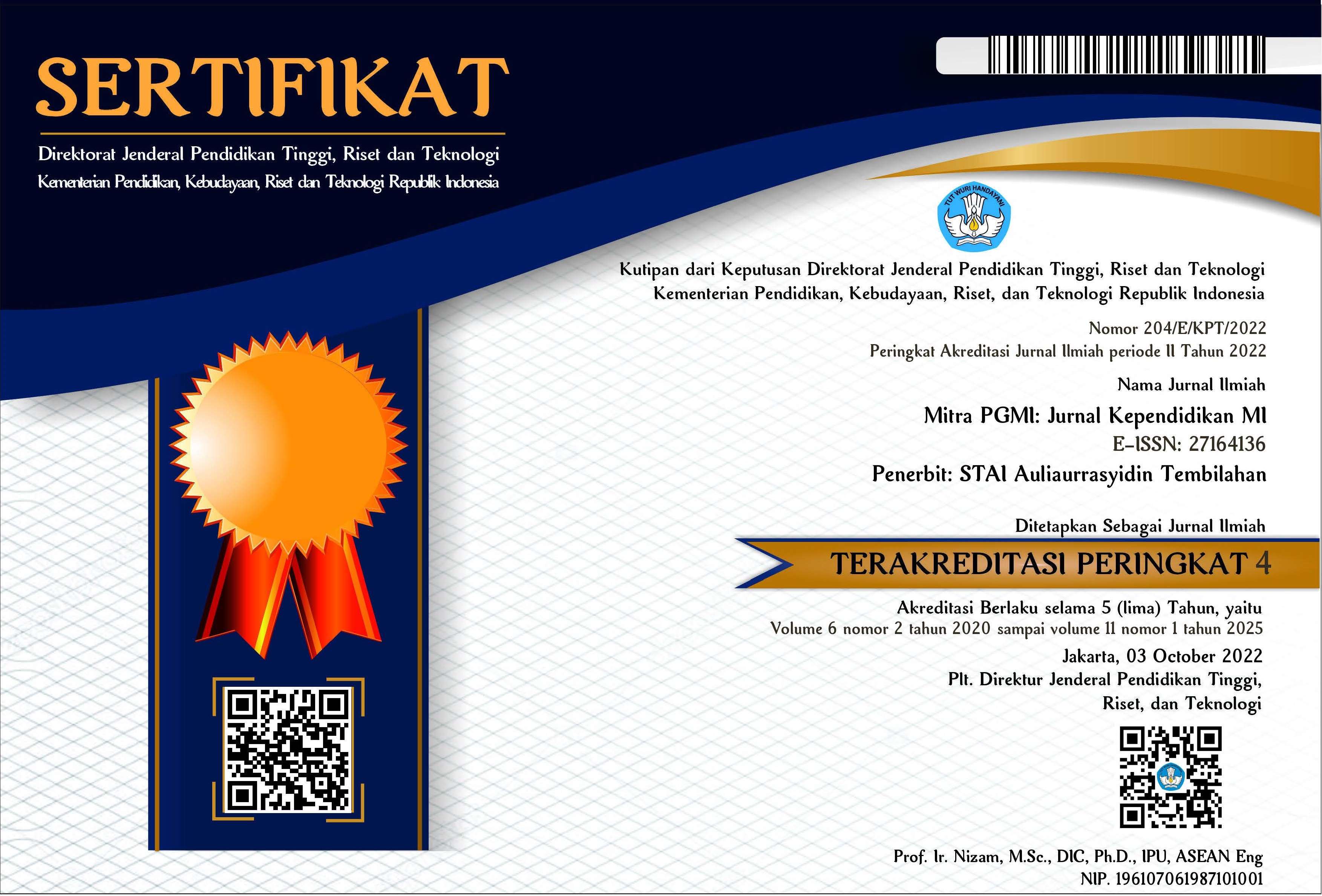Evaluation of the project program for strengthening the Pancasila student profile in Madrasah Ibtidaiyah
DOI:
https://doi.org/10.46963/mpgmi.v11i1.2330Keywords:
Evaluation, CIPP Model, Pancasila Student ProfileAbstract
The purpose of this study is to evaluate the Pancasila student profile strengthening project at Madrasah Ibtidaiyah. This research employs a mixed-method approach with the CIPP (Context, Input, Process, Product) evaluation model. Data collection techniques used in this study include interviews, observations, documentation, and questionnaires. The research subjects consist of madrasah heads, class teachers, and students. The objects of this study are Madrasah Ibtidaiyah Al-Bukhori Pekanbaru, Madrasah Ibtidaiyah Al-Birra Pekanbaru, and Madrasah Ibtidaiyah Tahfidz Cendekia Pekanbaru. The data analysis techniques used in this study are data reduction, data presentation, and verification/conclusion. The results of the study indicate that the implementation of the Pancasila Student Profile Strengthening Project (P5) learning using the CIPP model at the Pekanbaru City Elementary Madrasah is still in the less-than-good category and requires various improvements. These improvements are mainly needed at three main stages, namely input, process, and product. At the input stage, aspects that require attention include P5 learning resources, the availability of human resources that support P5 learning, and the P5 learning planning flow. At the process stage, improvements are needed in implementing P5 learning. Meanwhile, at the product stage, the learning outcomes of P5 learning also require improvement.
Downloads
References
Aida, P. S. E., Fauzi, A., & Wahyono. (2023). Implementasi Pengelolaan Kurikulum Pembelajaran Mandiri di SDIT Sabilul Huda Kota Cirebon Implementation of The Independent Learning Curriculum Management at SDIT Sabilul Huda Cirebon City. Jiem, 7(1), 13. https://doi.org/http://dx.doi.org/10.24235/jiem.v7i1.13286
Anita, Y., Kiswanto Kenedi, A., Azizah, Z., Safitri, S., & Khairani, R. (2023). Pelatihan Pengembangan Proyek Penguatan Profil Pelajar Pancasila Berbasis Teknologi Untuk Guru Sekolah Dasar. Jurnal Pengabdian Masyarakat, 6(2), 367–380.
Anwar, N., Romadhon, T. N., Sandro, A., & Khikmawanto, K. (2023). Peran Guru sebagai Fasilitator Pembelajaran dalam Mendorong Kreativitas Siswa. Jurnal Syntax Imperatif: Jurnal Ilmu Sosial Dan Pendidikan, 4(3), 208–214. https://doi.org/10.36418/syntax-imperatif.v4i3.240
Arif Muadzin, A. M. (2021). Konsepsi Peran Guru Sebagai Fasilitator dan Motivator Dalam Proses Pembelajaran Pendidikan Agama Islam. Jurnal Pendidikan Islam, 7(2), 171–186. https://doi.org/10.37286/ojs.v7i2.102
Artanto, D., Ibadin, H., & Suwadi. (2023). Penerapan Evaluasi CIPP (Context, Input, Process,Product) Dalam Program Rintisan Madrasah Unggul di MTsN 1 Yogyakarta. Al-Fahim, 5(1), 68–82. https://doi.org/10.54396/alfahim.v5i1.543
Bachtiar, B. (2020). Pengembangan Kurikulum Berbasis Kebutuhan Peserta Didik dan Kehidupan Global dalam Konteks Indonesia. Edumaspul: Jurnal Pendidikan, 4(2), 449–460. https://doi.org/10.33487/edumaspul.v4i2.2977
Direktorat KSKK, M. (2022). Panduan Pengembangan Projek Penguatan Profil Pelajar Pancasila dan profil Pelajar Rahmatan Lil Alamin. Kementerian Pendidikan Dan Kebudayaan, 1–108.
Fauziah, G. E., & Rohmawati, A. (2023). Implementasi Proyek Penguatan Profil Pelajar Pancasila (P5) dan Profil Pelajar Rahmatan Lil Alamin (P2RA) pada Siswa MI: Sebuah Upaya Membangun Karakter Disiplin dan Bertanggung Jawab Pada Siswa. Ibtida’, 4(2), 214–225. https://doi.org/https://doi.org/10.37850/ibtida’.v4i02.582
Fauziah, I., Ijudin, Holis, A., & Masripah. (2024). Implementasi Proyek Penguatan Profil Pelajar Pancasila (P5) Dalam Membentuk Karakter Mandiri Peserta Didik. Jurnal Intelek Insan Cendikia, 1(8), 1–10.
Hamzah, M. R., Mujiwati, Y., Khamdi, I. M., Usman, M. I., & Abidin, M. Z. (2022). Proyek Profil Pelajar Pancasila sebagai Penguatan Pendidikan Karakter pada Peserta Didik. Jurnal Jendela Pendidikan, 2(04), 553–559. https://doi.org/https://doi.org/10.57008/jjp.v2i04.309
Hia, A., & Susanto, Y. N. (2022). Model Evaluasi Program Context, Input, Process, Product Pada Pendidikan Agama Kristen Sekolah. Metanoia, 4(1), 45–57. https://doi.org/https://doi.org/10.55962/metanoia.v4i1.61
Hilmin, Dwi Noviani, & Eka Yanuarti. (2023). Internalisasi Nilai-Nilai Moderasi Beragama Dalam Kurikulum Merdeka Belajar Pendidikan Agama Islam. Symfonia: Jurnal Pendidikan Agama Islam, 3(1), 57–68. https://doi.org/10.53649/symfonia.v3i1.34
Khomsariyani, E., Alfarisa, F., & Robiansyah, F. (2024). Evaluasi Pembelajaran Projek Penguatan Profil Pelajar Pancasila (P5) Dengan Model Cipp Pada Sekolah Dasar di SDIT Bina Bangsa. Elementary School, 11(2), 315–332. https://doi.org/https://doi.org/10.31316/esjurnal.v11i2.4288
Kurniawati, E. W. (2021). jurnal Evaluasi Program Pendidikan Perspektif Model Cipp (Context, Input, Proces, Product). Jurnal Ghaitsa, 2(1), 19–25. https://doi.org/https://doi.org/10.62159/ghaitsa.v5i3.168
Mahmudah, S., Rondli, W. S., Ermawati, D., & Kudus, U. M. (2024). Analisis Profil Pelajar Pancasila dalam Kurikulum Merdeka Materi Hak dan Kewajiban di Kelas III. Innovative: Journal Of Social Science Research Volume, 4(5), 122–136. https://doi.org/https://doi.org/10.31004/innovative.v4i5.14783
Mualifa, L., Wardatussa’idah, I., & Wardhani, P. A. (2024). Evaluasi Program Projek Penguatan Profil Pelajar Pancasila (P5) Aksi Detektif Lingkungan Di Kelas 4 SDN Cilangkap. Jurnal Ilmiah PGSD FKIP Universitas Mandiri, 10, 653–663.
Novayanto, R., & Mawardi. (2024). Evaluasi Program P5 (Proyek Penguatan Profil Pelajar Pancasila) Kelas V SD Negeri Sidorejo Lor 03 Salatiga Menggunakan. Pendas, 09(03), 321–335. https://doi.org/https://doi.org/10.23969/jp.v9i3.17979
Putri, E. D. (2023). Wawancara Pengawas Tingkat Madrasah Ibtidiyah Kota Pekanbaru.
Rachmawati, N., Marini, A., Nafiah, M., & Nurasiah, I. (2022). Projek Penguatan Profil Pelajar Pancasila dalam Implementasi Kurikulum Prototipe di Sekolah Penggerak Jenjang Sekolah Dasar. Jurnal Basicedu, 6(3), 3613–3625. https://doi.org/https://doi.org/10.31004/basicedu.v6i3.2714
Riki, M. (2023). Pelatihan Implementasi Kurikulum Merdeka Berbasis Komunitas (Angkatan 1) Wilayah Kerja Kantor Kementerian Agama Kota Pekanbaru. Kementerian Agama Kota Pekanbaru. https://pekanbaru.kemenag.go.id/newsite/home/single_blog/3587
Rismawanda, H., & Mustika, D. (2024). Kemampuan Guru dalam Menyusun Modul Ajar pada Kurikulum Merdeka di Sekolah Dasar. Aulad: Journal on Early Childhood, 7(1), 32–42. https://doi.org/10.31004/aulad.v7i1.575
Santika, R., & Dafit, F. (2023). Implementasi Profil Pelajar Pancasila sebagai Pendidikan Karakter di Sekolah Dasar. Jurnal Obsesi, 7(6), 6641–6653. https://doi.org/10.31004/obsesi.v7i6.5611
Ummah, M. S. (2019). Penerapan Peran Dan Fungsi Guru Dalam Kegiatan Pembelajaran. Pionir: Jurnal Pendidikan, 11(1), 1–14. https://doi.org/http://dx.doi.org/10.22373/pjp.v9i2.9087
Utami, K., & Mustofa, A. (2024). Evaluasi Pelaksanaan Projek Penguatan Profil Pelajar Pancasila di SMA Negeri Kabupaten Jombang. Jurnal Mahasiswa, 2(1), 69–78.
Veronika, F., Khosiyono, B. H. C., Cahyani, B. H. C., & Nisa, A. F. (2023). Evaluasi Efektivitas Penanaman Karakter Melalui Proyek P5 Di SD. Jurnal Ilmiah Pendidikan Dasar, 08 Nomor 0, 4106. https://journal.unpas.ac.id/index.php/pendas/article/view/10879/4806
Wijaya, S. (2023). Pentingnya Pelatihan Dan Pengembangan Dalam Menciptakan Kinerja Karyawan di Era Digital. Analisis, 13(1), 106–118. https://doi.org/10.37478/als.v13i1.2523
Downloads
Published
Issue
Section
License
Copyright (c) 2025 Muhammad Amin

This work is licensed under a Creative Commons Attribution-ShareAlike 4.0 International License.
Authors who publish with this journal agree to the following terms:
1. Copyright on any article is retained by the author(s).
2. The author grants the journal, right of first publication with the work simultaneously licensed under a Creative Commons Attribution shareAlike 4.0 International License that allows others to share the work with an acknowledgment of the work’s authorship and initial publication in this journal.
3. Authors are able to enter into separate, additional contractual arrangements for the non-exclusive distribution of the journal’s published version of the work (e.g., post it to an institutional repository or publish it in a book), with an acknowledgment of its initial publication in this journal.
4. Authors are permitted and encouraged to post their work online (e.g., in institutional repositories or on their website) prior to and during the submission process, as it can lead to productive exchanges, as well as earlier and greater citation of published work.
5. The article and any associated published material is distributed under the Creative Commons Attribution-ShareAlike 4.0 International License








2.png)


